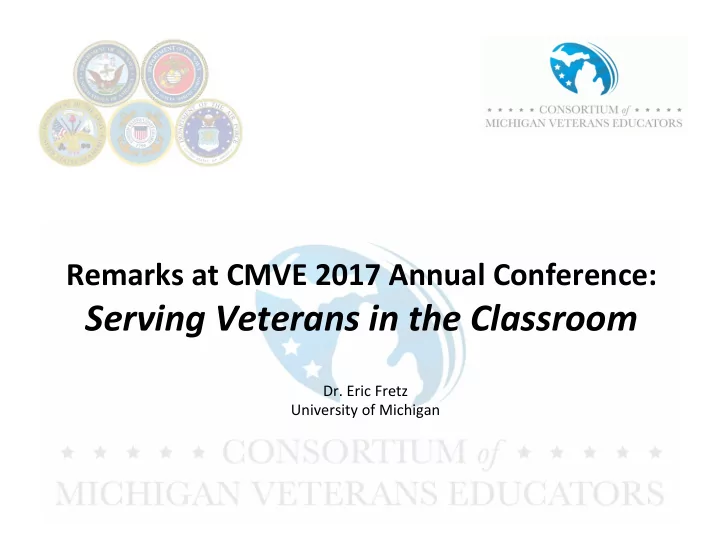

Remarks at CMVE 2017 Annual Conference: Serving Veterans in the Classroom Dr. Eric Fretz University of Michigan
Where we’re going today STUDENT VETERANS • Who are they? – How do we even define a “veteran” ? • How are they “different”? – And are some of their differences actually similariJes? • What are their most common concerns? • What are some top resources to improve awareness and cultural competency?
Why should you listen • 24 years in uniform, U.S. Navy (ret) • 3 deployments to Persian Gulf combat zone across 2 wars • Service under, alongside, and over every branch of service • 24 years in post-secondary classrooms as student or faculty • SVA mentor and educator for mulJple campuses (1000’s of vets) • Chairman of Michigan’s Region 9 Veteran Community AcJon Team (VCAT9, 6 counJes and 50,000+ veterans) • Editorial Board for Journal of Veterans Studies • Founder of two 501c3 charitable organizaJons to help veterans • Public speaker/trainer for Student Veteran issues naJonwide, including “cultural competency” training for faculty
You Don’t (necessarily) Know Who They Are
Many (but not all) “hide in plain sight” for a variety of reasons • WanJng to “put that phase behind them” – Not always due to negaJve feelings towards military • WanJng to “fit in” or “pass” as regular student • Concerns about “military bullshi#” (SVA/orgs/center) • Not certain they are welcome (feel differences acutely) • “Self-isolaJng” due to maladapJve habits (suck it up) • Perceived benefit/cost raJo for being “out” (rep)
A community with unique issues: • What we have asked of them is historically without precedent! – WW2 = 10 million over 4 yrs / 1-2 yrs / 10 days – GWOT = 2 million over 16+ yrs / ? yrs / 1000 days+ • 1.5+ million deployments since 2001 • Lack of training/experience/control is a problem… • “Moral Injury” as a concept…. • The military is at war, America is at the mall… • Almost 200,000 have done 5+ deployments… • And even those who never deployed are ‘re- calibrated” in significant ways... (deploy, isolate, stress, toxic, danger)
A community with unique issues: • From Boot Camp to the worst of War…it’s not “normal” or “natural” • Mental Health concerns: – Up to ¼ experience anxiety or depression – 45% experienced “significant” PTSD symptoms (at some point!) – 46% considered suicide ( 6% for all students) – 10% frequent thought or acJon • But their resilience is amazing... Focus on the amazing. The vast majority of Veterans are high funcJoning!!! * David Rudd NaJonal Center for Veteran Studies
A community with unique issues: • SOME things are similar to other student communiJes you already know how to serve: – Older / “Chronologically advantaged” (frustraJon with “youth”) – Married and/or with kids (finances!, work life balance) – Commuter (frustraJon with Jme management, parking) – Part-Jme – First generaJon college students (system/resource awareness, Impostor Syndrome) • They actually have much in common with many of their campus peers… help them see that.
A community with unique issues: • SOME things are preqy unique: – Cultural divide / De-Greening (hierarchical, owned, norms “BLUF”!) – Self-IsolaJon tendencies (‘man” up, embrace the suck, deal with it) – MasochisJc approach to struggle and Avoidance of helpseeking – Degree as “qual” - uJlitarian strategies – Lack of purpose, affiliaJon. Yearning to return to the team. (oxy) • Most of this is solved with affiliaJon to a support structure/team!
Their Experiences Are Impossibly Diverse • There is NO “typical Veteran” – Examples: • “Veteran” ≠ “Combat” – Find 12 agencies or programs, get 12 definiJons (20 yrs reserve, “are you?”) • Combat Zone/Pay ≠ “Combat” (even defining combat…) • Strongly inbred aversion to mental health services and help-seeking in general (who’s cooler) • As with any “group” member, you must get to know them as an individual….
So why do Veterans feel misunderstood?
They Don’t Trust You To Not Stereotype Them
RESOURCES • For military awareness/history – Uniformed Services University CDP • hqp://deploymentpsych.org/online-courses/military-culture – VA training • hqps://www.mentalhealth.va.gov/communityproviders/ military_culture.asp • For military/veteran cultural competency – hqps://psycharmor.org/ – hqps://kognito.com/products/veterans-on-campus- for-faculty-staff
Treat them the way a progressive, enlightened campus treats all other groups… • Avoid stereotypes and micro-aggressions – Presuming right wing affiliaJon / beliefs – Labeling “angry veteran” (plenty of students are unreasonable and fussy!) • Assert your “veteran friendly” posture – They feel much more mature, and don’t understand others can’t see that • Don’t make them “representaJves” – “What do Veterans think of the war, Sarah?” – Be sure it is ok to “out” them before you do (because…) • Monitor classroom discourse – They oven just want to “pass” – “Did you kill anyone?” L Trivializing service (John Kerry effect) – Group work drama, but also aversion to help-seeking • Respect : )
Veterans bring fantasJc traits to your campus, make sure the Vets AND your campus know it! • Maturity • Loyalty • Time management • Intense Work Ethic • Life experience • World Travel, Expanded Cultural Lens • TradiJon of selfless service • Team skills / Team spirit
QuesJons… Dr. Eric Fretz ebfretz@umich.edu
Recommend
More recommend